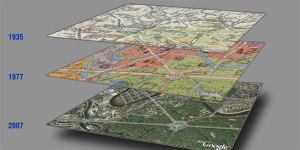Digital humanities, the intersection of computing and the disciplines of the humanities, has continued to develop as a dynamic field. This week, on November 4th and 5th, there will be several events that bring practitioners of digital humanities to UVM.
Leading off is the Burack Lecture Series speaker, Todd Presner, Chair of the UCLA Digital Humanities Program and Professor of Germanic Languages and Comparative Literature. His topic “HyperCities: Thick Mapping in the Digital Humanities” will examine a web-based mapping project that brings cultural and historical information together with physical location. Presner’s talk will show how a “hypercity” is a real city
 overlaid with information networks that document the past, catalyze the present, and project future possibilities. He will describe the humanist project of participating and listening that transforms mapping into an ethical undertaking–thick mapping. Moving from Berlin to Los Angeles, Cairo to Sendai, the talk will explore how “thick mapping” in the digital humanities presents new ways to understand, document, and consider historical events, ranging from the destruction of Berlin in WWII to the history of redlining in the US in the 1930s to the 2011 “Arab Spring” and the Fukushima nuclear power plant disaster.
overlaid with information networks that document the past, catalyze the present, and project future possibilities. He will describe the humanist project of participating and listening that transforms mapping into an ethical undertaking–thick mapping. Moving from Berlin to Los Angeles, Cairo to Sendai, the talk will explore how “thick mapping” in the digital humanities presents new ways to understand, document, and consider historical events, ranging from the destruction of Berlin in WWII to the history of redlining in the US in the 1930s to the 2011 “Arab Spring” and the Fukushima nuclear power plant disaster. 11:30-1:00, in 302 Bailey/Howe
The events continue on Thursday, starting with an informal faculty lunch. Faculty interested in the digital humanities across campus are invited to come, share ideas, discuss projects, and learn more about possibilities.
AFTERNOON:
3:15-4:14, Kalkin 325.
Two afternoon public talks will open with Erin R. Anderson (English, UMASS Boston) on “Ethical Making and the Making of Ethics.” According to Anderson, to call oneself a maker in the digital humanities is often to align oneself with an economy of tool building, text mining, and data visualization. But what are the possibilities for making beyond the tool? How might artistic methods—critically inflected—contribute to our (post-)humanistic engagement with digital culture? Anderson will discuss her creative-critical practice with digital voices and archives, considering the ethical stakes at the heart of such work. Sharing clips from an experimental audio drama titled Our Time is Up, she situates her practice as an intervention into the prevailing “culture of preservation,” which surrounds the audio archive, and as an opening to new, generative forms of ethical and material relations.
4:30-5:30, Kalkin 325
Isaac Weiner (Religious Studies, Ohio State), will follow with “Soundmapping American Religion.” This talk will introduce the Religious Soundmap Project, a collaborative research initiative of Ohio and Michigan State Universities, which aims to map American religious diversity through sound. Teams of faculty and student researchers are producing high quality field recordings of religion in practice, which will be edited, archived, and integrated, along with photographs, interviews, explanatory texts, and interpretive essays, onto an online mapping platform. This innovative digital project will offer new research and pedagogical tools for scholars, experiential learning opportunities for students, and an interactive resource for the general public. In this talk, he will offer some brief reflections on the opportunities and challenges encountered in their work.
5:45-7:00, Kalkin 325
The day will close with a Rountable Discussion with Todd Presner, Erin Anderson, Isaac Weiner, and moderated by Abby McGowan (History, UVM). We will explore the possibilities and problematics of digital humanities work, and how and where it has offered the panelists new tools as scholars, new modes of presenting and exploring ideas, and new ways of building audiences and communities.
We hope you will join us for any or all events to learn more about the digital humanities.
All events are coordinated by the cross-campus group Visualizing Ideas in the Digital Humanities, with funding from the Lattie Core initiative of the UVM Humanities Center.
